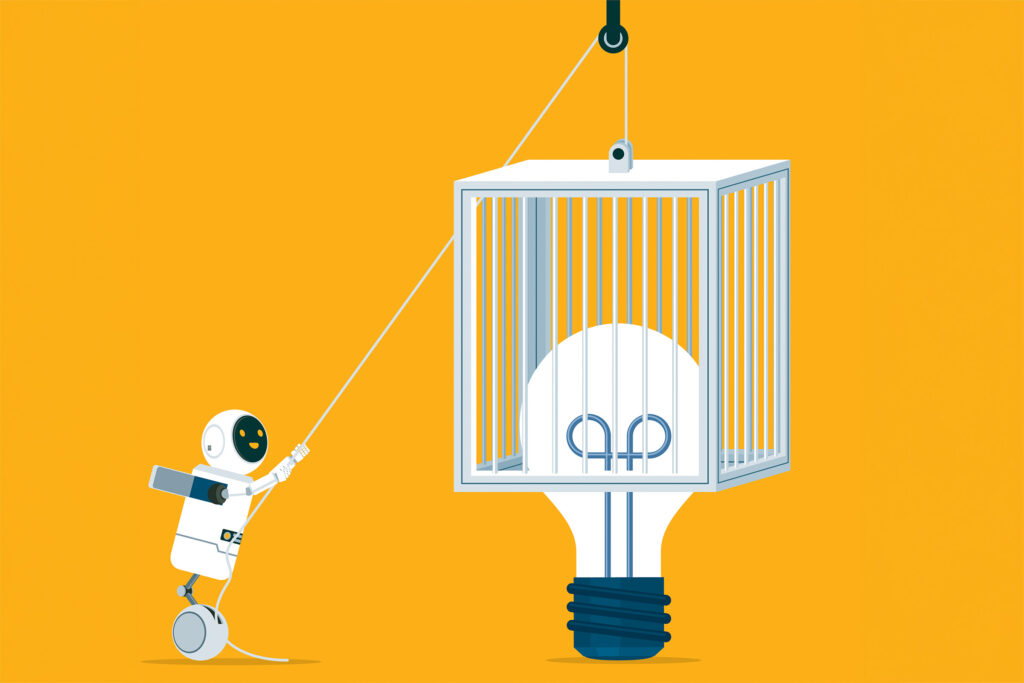On Aug. 7, a judge in the U.S. District Court for the District of Columbia ruled Google was guilty of creating and maintaining an illegal monopoly over internet search systems.
The ruling begins to resolve the 2020 case brought against Google by the U.S. Department of Justice. The court will decide on penalties or amelioratory actions in a second trail stage beginning in September.
U.S. District Judge Amit P. Mehta ruled Google maintained its monopoly by paying smartphone and computer manufacturers to be included as the default search engine on new devices. MIS professor Hani Safadi argues it’s not just Google’s default status that makes it a monopoly but the amount of proprietary consumer data it can leverage to improve search results and attract advertisers.
In his 2023 paper, “Knowledge monopolies and the innovation divide: A governance perspective” in Information and Organization, Safadi and former Terry College MIS professor Rick Watson argue dominant tech firm’s exclusive access to proprietary data also has a chilling effect on innovation, competition and the kinds of services consumers have access to.
He’s here to answer a few questions about how knowledge monopolies work and why they stifle innovation.
1. What do you mean by “knowledge monopoly”?
A knowledge monopoly refers to a situation where a company has exclusive access to a vast amount of data, which it uses to gain a competitive edge through making more informed and strategic decisions, optimizing products, marketing and pricing. This exclusive access to unique data creates a significant barrier for competitors and reinforces the monopoly’s dominance — potentially limiting the variety and quality of services available to consumers.
2. Why are knowledge monopolies dangerous? How are they bad for consumers?
However, beyond the traditional arguments against monopolies, knowledge monopolies make it harder for competitors to create innovative products and services by controlling exclusive access to data. If we think about monopolies as restricting current competitors, knowledge monopolies restrict future competitors, given the need for data to compete in the knowledge economy.
3. How does Google’s operation fit into this category?
As an example, our paper discusses how Amazon leverages data from its marketplace hosting independent sellers. By controlling the platform and the transaction data, Amazon gains valuable insights into which products sell well and at what prices. This knowledge allows Amazon to develop new products, like Amazon Basics, that directly compete with third-party sellers. As a result, Amazon benefits from its expansive data resources to outcompete vendors who lack access to similar proprietary insights, reinforcing its dominant market position.
The 2024 ruling against Google fits a traditional definition of monopoly rather than a specific knowledge monopoly definition, but there are plenty of examples of Google exhibiting knowledge monopoly behavior.
For instance, in 2010, Google leveraged the acquisition of Freebase, a large community-based knowledge base comprising data contributed by community members that is freely and publicly accessible. Google incorporated Freebase’s content into its proprietary Knowledge Graph system to enhance its search services. Subsequently, Google disabled public contributions to Freebase and eventually shut it down in 2016. By appropriating the community-generated data and integrating it into its closed system, Google reinforced a competitive edge in search.
4. How do you think the improvement of AI-based search affects knowledge economies? Is Google’s core search service on the way out anyway?
It is difficult to predict technology’s trajectory. A new technology like GenAI or others may replace the search services we’re all used to.
This is the essence of creative destruction in a capitalist economy where innovations replace old ones. Indeed, we make a capitalist argument against knowledge monopolies. Namely, in our knowledge economy, innovation is data-driven. By creating significant barriers for other companies to access data and insights necessary for innovation, knowledge monopolies stifle innovation that could potentially replace theirs.
Consider, for instance, a 2023 DOJ testimony related to the recent ruling that suggested that “ChatGPT and other technology innovations may have been released years ago if Google hadn’t monopolized the search market.”
One last point about data. Of course, companies that create intellectual property (IP) should enjoy leveraging it. However, Google and many big tech companies appropriate data created by outside entities — either by harvesting it or leveraging their platforms to collect it from users.
They use the data later to improve their products and make that data hard to impossible to access for others.
Consider generative AI reliance on mined data to create sophisticated models. Only a few companies have access to such data and also computation resources, challenging smaller companies and the public sector, such as universities.
5. If you were advising Judge Mehta, what operational remedies would you suggest? What would level the playing field for new services and startups?
We offer two recommendations. Number one: we need to be aware of new types of monopolies that do not fit the traditional definition, such as knowledge monopolies. The FTC, under Lina Khan, has been doing an excellent job in this domain. Number two, as we outline in the paper, legislators and regulators need to take data rights and obligations seriously — in line with other property rights in the economy. This involves considering:
- Data access rights: Ensuring all market participants, including new services and startups, have fair and reasonable access to essential data. This can help break down the significant barriers created by data exclusivity.
- Data capture rights: Defining and enforcing clear guidelines around which entities can capture data during interactions within digital platforms. Companies should not have exclusive rights to capture and use data from activities involving third-party participants.
- Data Obligations: Regulating what technology and data firms must share or disclose, ensuring transparency and equitable access to the critical information needed for innovation and competition.
- Restrict data appropriation: Limiting the ability of dominant firms to appropriate data from third parties without appropriate compensation or reciprocity. Implement measures to prevent the excessive accumulation of data that could be used to stifle competition.

